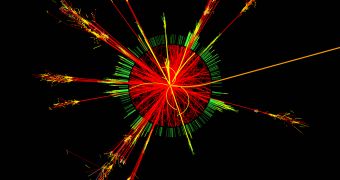The discovery of a particle very similar or quite possibly the actual Higgs boson is one of the big achievements of experimental physics in the last few years. With it, the Standard Model is complete, the LHC has proved its usefulness and so on, plenty of reasons to celebrate.
But there may be one reason to worry. As it stands, the Higgs' boson's current mass means that the universe is inherently unstable and that, at some point, may simply wipe itself out, along with everything else in existence.
Joseph Lykken, a theoretical physicists who has worked on the Large Hadron Collider experiments, explained at the annual American Association for the Advancement of Science that if the current data is correct, the universe is in danger.
The Higgs boson is the particle manifestation of the Higgs field that stretches across the universe. If the mass of the Higgs boson is that which we have determined now, the universe is in an unstable false quantum vacuum.
This means that what appears to be a stable state, the one which the universe currently occupies, may not be the lowest energy state and therefore is only stable for a period of time and in some conditions.
If that's true, possibly billions of years from now, one tiny portion of the universe will find a way to get to that lowest energy state, or to another pseudo-stable one.
This will trigger a domino effect that will in essence "reset" the entire universe and everything else in it, destroying everything in its path, planets, galaxies and all in between.
There are a few bright sides, for one, this would only happen a long time after we, the sun and the Earth for that matter, will be gone. It will also happen at the speed of light, so you wouldn't even know it's coming, you'd just cease to exist at some point.
And there may be further hope, for one, there is a significant margin of error in the current measurements. If the mass of the Higgs boson is only slightly off from the current calculations, the universe is stable.
There is also the possibility that what we found isn't the Higgs boson or that it isn't the only one and that further particles similar to it but much heavier will be found once the LHC starts working again at higher energy levels.
What's more, all of this assumes that the standard model is correct and that it's the only thing governing the universe, which we know is not true if only because it doesn't explain gravity. If the theory of supersymmetry is correct, the universe is safe as well. In conclusion, there are plenty of other things that could destroy the universe that we haven't even thought of.

 14 DAY TRIAL //
14 DAY TRIAL //